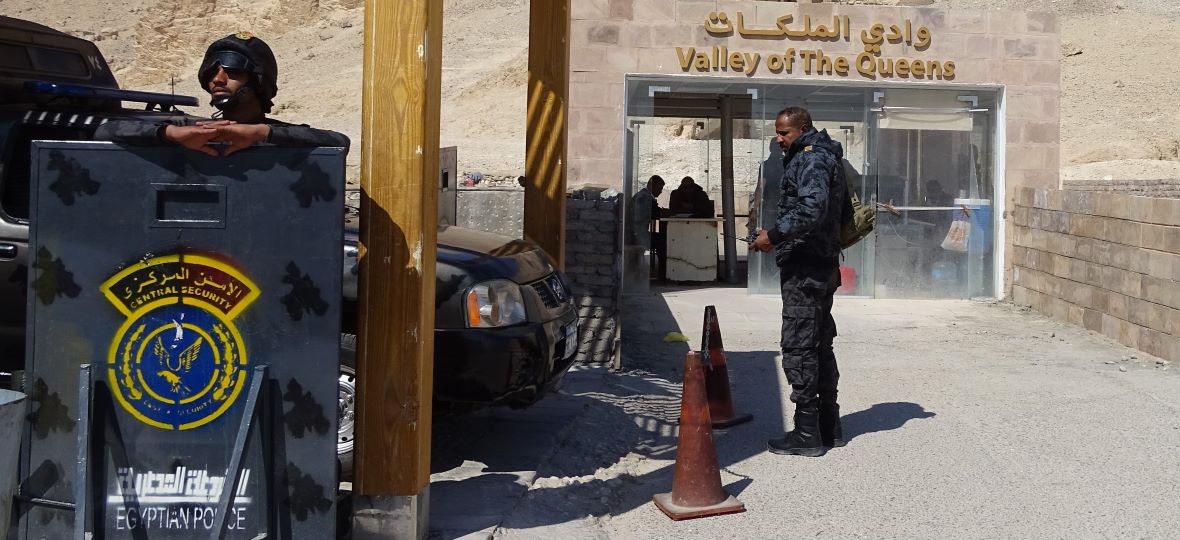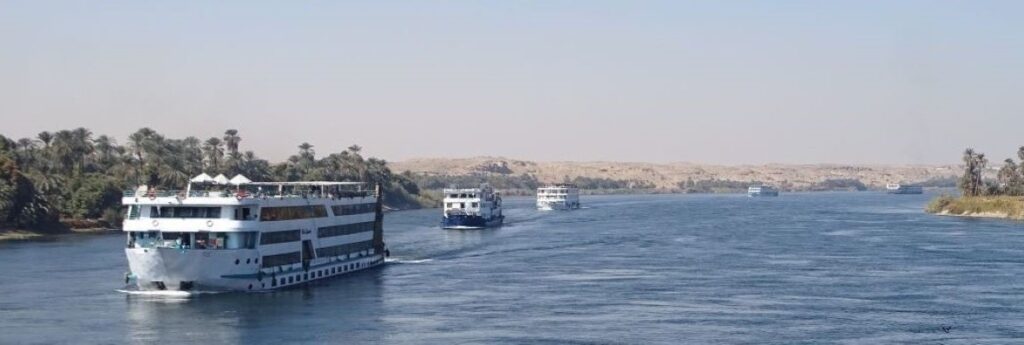The cruise ships dot the Nile like planes coming into an airport, though the procession belies the fact that they are operating at half capacity or less as Egyptian tourism continues to be rocked by the country’s perceived proximity to the war in Palestine – despite the fact that the distance from Gaza to Giza is close to 500 km., and through the Sinai desert no less.
“It’s so disappointing,” says Samir Ahdy, director of operations for the Sonesta St. George1 Nile cruise ship, of the downturn in business since war broke out between Israel and Hamas in October. The skirmish has had the spillover effect of leading to, in some cases, 60% cancellations at Egyptian travel companies by concerned clients.
“Anyone who knows anything about Egypt knows that life is normal (here) – like it was before (the war),” Ahdy told Travel Industry Today during a Goway Travel FAM trip to Egypt last week.
Until hostilities broke out, Egypt was enjoying a booming tourism season – so much so that tour space and cruise cabins on the Nile were almost impossible to find. Now, Ahdy is worried about next fall, with the typical booking period set for March and April.
“Even if the war ends in five minutes, nothing will change for this season,” he lamented. “We’re at the stage that we don’t even know what to say. Anybody who hears from friends or social media, ‘Don’t go to Egypt,’ I don’t know why.”
Ramez Gameil of Emeco Travel, Goway’s DMC in the country, says Americans constitute the largest segment of cancellations (and Russians, for their own reasons), less so Canadians.
“We used to say that we don’t have to market Egypt. People come to us,” he said.
But that’s not the case now as Egypt’s tourism industry and their international partners work to bolster Egypt’s image as a safe destination for travel, despite the troubles of its neighbours.
So, is Egypt safe?
On our Goway excursion, joined by several prominent travel agency executives, who spent several days in Cairo and Alexandria, plus sailed on the Nile cruise for four nights, there were absolutely no incidents, references, or concerns about the war in Gaza, beyond dismay over the humanitarian cost and, of course, its effect on Egypt’s tourism industry.
Chaotic Cairo is carrying on, never calm, but unperturbed.
In Aswan, Nile guide Ramy Fakhry observed, “It (the war) is so far away.” (It’s about 1,200 km. from Gaza to Aswan – about the same distance as Toronto to Thunder Bay, or Vancouver to Edmonton).
“And our borders are very secure,” he added proudly.
As further evidence, international VIPs continue to meet in Cairo for discussions to end the war. (The Turkish PM arrived as we were leaving.)
Within its borders, Egypt provides a sense of security through a strong but not overbearing police presence that includes traffic checkpoints for vehicles on city roads and entering tourist sites. And visitors to museums and temples (plus airports and hotels) quickly become accustomed to quick bag screenings through ubiquitous metal detectors (sometime more than one in the same venue).
No one gets very far Egypt without being scanned.
“You don’t see that level of security in other countries,” observed FAM participant Cece Drummond, VP of Strategic Partnerships at TRAVELSAVERS. “It makes you feel safer.”
She noted that the measures, which include dedicated “tourist police” were a constant long before the war.
(Egypt significantly upped its security game after an incident in 1997 in which a tourist bus was attacked in the Valley of the Kings in Luxor and 62 people killed – an event that occurred 27 years ago and still colours perceptions of Egypt, prompting observers like Sonesta’s Ahdy to wonder whether, for example, tourists still avoid New York because of the events of Sept. 11, 2001, or Paris or London, both of have which have been victims of several more recent attacks).
On our trip, our vehicles were stopped multiple times for (driver) ID checks, including, upon entry to Cairo airport, scrutiny from a police officer with the words “bomb squad” on his sweater.
A similar presence is on display at prominent sights, from the pyramids in Giza (part of metro Cairo) to the valley of the Kings and Queens near Luxor.

Karryn Christopher, EVP of marketing and preferred partnerships for the Signature Travel Network said she had no reservations about joining the Goway excursion to Egypt, a first-time destination for her.
“I had no expectation that I wouldn’t feel safe,” she stated, adding that after touring the destination for a week, “I am as confounded as most people I met here that the misunderstanding (about security) is so great.”
Christopher said STN in the US did not experience the cancellation of any groups after the war broke out, adding she believes agents can (and should) play a key role in reassuring clients about the viability of Egypt, considered by many a bucket list destination.
“It’s the proactiveness of it – making a good plan with good agent advice,” she said. “You can’t let stuff you don’t know about impact where you travel and what you do.”
The Egyptian Tourist Authority is certain that seeing is believing and launched a video campaign late last year showing in-destination, time-stamped (i.e. post war) testimonials of tourists enthusing about their worry- and trouble-free visits.
“I am here to confirm to you that Egypt is 100% safe,” said ETA director Amr El Kady.
For its part, Goway was also determined to bring agency reps (and select media) to the destination to see for themselves.
FAM leader and Goway sales manager Renée Stanton-Defaria said “the proximity of the war never occurred to me before. And since I arrived, I’ve never felt an ounce of feeling of being unsafe.”
She added that she learned in an exhibit at Alexandria Library that Egypt has not been in a war since 1973, stating, “As a nation, they are a very peaceful people.”
Equally emphatically, Stanton, declared, “(Goway) would not send me somewhere that is not safe! We have a responsibility to our clients.
“We do not send people into war zones!”

